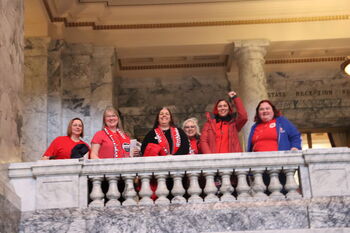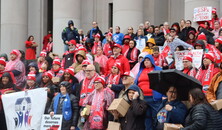Celebrating our progress in the 2024 legislative session

WEA members have lots to celebrate and still lots to advocate for. Thursday evening, both chambers gaveled out for the end of the 2024 legislative session. Lawmakers passed a supplemental budget that will add significant funds to education and passed policy bills that will make our schools safer and more inclusive. We made steps forward this session that we can continue to build on next year.
2023-2024 Supplemental Budget
Thousands of us sent emails calling for legislators to fund ESP staffing and pay and raise the Special Education funding cap, and it shows: Education was one of the only parts of the budget that increased from both the House and Senate proposals to the final conference-agreed budget.
- $72 million additional for prototypical staffing for paraeducators, office workers and non-instructional aides
- $20 million increase in Special Education funding following the increase from 15% to 16% funding cap
- $306 million additional in capital funds for education, including $45 million for updating school HVAC
- The 2024-25 school year COLA is set at 3.7% for K-12. For higher-education faculty and staff covered by Initiative 732, the COLA for FY 2025 is 5.8%.
- $4 million was added to the budget to support WEA’s teacher residency to prepare special education teachers and emergency substitute programs.
Read more about education funding in the supplemental budget
Making our schools safer and more inclusive
- Inclusive materials in schools (SB 5462) will ensure students have access to materials and learning that includes LGBTQIA+ individuals.
- Protecting students’ freedom to learn by creating clear processes and procedures required before books can be removed (HB 2331) will protect materials from arbitrary censorship.
- Fentanyl and substance-use education (HB 1956) adjusts the standards for middle- and high-school health/PE to include fentanyl.
Improving educators’ jobs
- Paraeducator Fundamental Course of Study (HB 1277) clarifies the requirement for in-person PD and provides additional guidance and rules around PD for paraeducators.
- Adjunct faculty access to the Public Service Loan Forgiveness program (HB 1950) counts non-instructional hours toward the calculation of hours worked for the purposes of determining PSLF eligibility.
Building toward the 2025 legislative session
We made progress, but we’re not there yet. While the funds in the budget add to what’s available for local unions to bargain for, ESPs urgently need a raise. Every lawmaker I’ve talked to knows this. Next year is a full legislative session with a full budget (as opposed to the smaller supplemental budget we had this session) and we’ll be back, louder and stronger than ever, to call for respectful, professional wages for our support-staff colleagues.
We also know one of the biggest challenges we all face is supporting students struggling with behavioral health. We’ll continue building on our work to help legislators understand the urgency of taking action to ensure safe, supportive, inclusive schools for all students and staff, creating wholistic responses to the challenges posted by disruptive and unsafe behaviors and fulfilling the unmet needs of students and educators alike.


